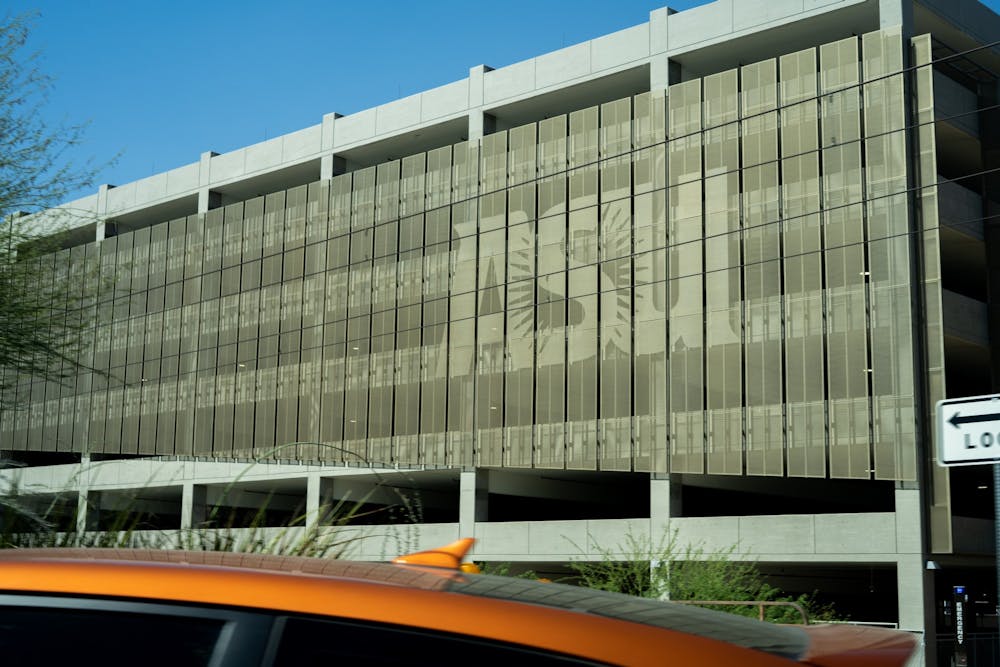One of the most common complaints you’ll hear is that there's no parking on campus.
It's the reason students are late to classes, meetings and events. Finding parking on campus can be a nightmare.
That doesn't even mention the cost of getting a parking permit on or near the Tempe campus, which can cost anywhere from $280 to $780.
Some have no choice. Many students commute from home, have families to support or have jobs where the only option to commute is by car. This opinion is not for those folks for whom parking is needed.
But students on or near campus who constantly drive should reconsider how they get there.
The metro Phoenix area is incredibly car-centric, with only very recent and limited improvements to the existing infrastructure. However, existing in Tempe and downtown Phoenix is not only possible but also presents a better lifestyle for students with the ability to ditch the car for a semester.
Students also may not feel safe on the light rail, streetcar or buses, a complaint I have heard from particularly women who feel unsafe at night while on public transportation.
However, our parking is at a premium. These spaces are money pits, and unless you live elsewhere in the Valley or have a job to commute to, there is little to no reason to have a car on the Tempe or Downtown Phoenix campus as a resident.
An ASU spokesperson said in a written statement that Parking and Transit Services reviews parking availability and use throughout the year and plans accordingly. They said that although some lots are crowded at certain times, there is sufficient parking on campus currently.
They gave the example of the acquisition of the EVB Parking Garage near the Downtown Phoenix campus at 460 N. Third St. by ASU to respond to the growing campus population and increasing demand.
David King is an associate professor of urban planning at the School of Geographical Sciences and Urban Planning. He said it costs a lot to build parking at ASU, and prices are fairly cheap.
"Building parking is very expensive to ASU," King said. "Parking is very cheap to ASU students, faculty and staff. Even though they don't think so because they want to, they want it for free because we expect free parking just about anywhere we go."
He said surface parking is the cheapest kind of parking infrastructure, but building that kind of parking in a dense city like Tempe and on an even denser University campus is difficult.
"A surface parking lot is the cheapest way to go where you're going to just put asphalt down but that's also a terribly inefficient use of that land and the ASU campus and Tempe overall have very scarce land, there's no more land to build," King said.
King said you can only build up or down in Tempe. According to King, some parking structures are being built on campus, notably between Mirabella and the new Omni Hotel on Mill Avenue and University Drive. He said underground parking structures are also possible, but each spot is worth money in the "high five figures."
ASU has to comply with parking standards laid out by Tempe and Phoenix for whatever they are building, which vary, and the University has to go through a joint committee for approvals for those projects, according to a Tempe spokesperson in a written statement.
"It's not that they're saying it's expensive compared to building a building that you would use to live in or work in or whatever. It's not those other buildings are more expensive than parking structures," Deborah Salon, an assistant professor at the School of Geographical Sciences and Urban Planning, said. "But considering you have to pay a lot of money to just store your cars, then it starts to sound like that's crazy and really expensive."
King said that, past what is being built now, he believes there is no intention to build any more parking with what little land is left to build near campus. Part of this, he said, is because parking capacity has gone down since 2020 as a long-term result of hybrid learning.
"There's just not as many people coming to campus every day," King said. "If all of your meetings are by Zoom. Why would you show up other than when you have to be there for class or (to) go to the library or do some of the other physical things that you have to do on campus when you could stay home and you can save the cost and the time of commuting?"
Parking demand is low, and the University can use its money for other student accommodations. Also, by not having a car, students eliminate gas, insurance costs and repair costs.
Tempe has gone to extraordinary lengths to increase the walkability and accessibility of its infrastructure. If you think driving around Tempe is difficult, it is by design. On the light rail corridor, from Mill Avenue to Apache Drive eastward, high-rises are springing up where students can live off campus and not have to drive to campus or anywhere else where they might go, including Mill Avenue and downtown Phoenix.
READ MORE: Valley Metro rail extension to bring more riders, housing along the public transit line
"The city and the University are both trying to not just reduce parking, they're trying hard and investing a lot of money into reducing demand so that people are able to live near campus and be able to walk or bike," King said.
King said many people don't take public transportation because they don't know how to use it properly. He said the University should educate new students, especially students from out of state, about the alternatives to getting around campus and the surrounding cities.
"Those types of interventions with when you can catch somebody just as they're moving or they're changing jobs," King said. "People are open to changing their mode of travel, but they often don't know how. So there's outreach, things like that, that can happen."
Regarding public transportation safety, King said this was a problem that needed to be addressed, and the issue extends beyond Phoenix and is a larger humanitarian issue.
"The lack of feeling safe on public transit is somewhat related to the increase the dramatic increase in homelessness, that there (are) more interactions on public transit between unhoused people and police who are who are enforcing it," King said.
In June 2023, Valley Metro began Operation Blue Ride, which increased Valley Metro's security presence in conjunction with an increased police presence in station and rail cars in Mesa.
He said the most important thing to make people feel safer in transit is more ridership, which can take a few years. He said he hopes more people use transit to make it feel more safe for everyone.
If you live on Apache Boulevard and only go to class and back, you should walk or take the train. It's a safe, active way to get around, and makes you a larger part of the community. It's also much cheaper than having to spend money on gas. There are things you need to drive for: grocery runs and other errands, doctor's appointments, going outside of Tempe and many others, but classes close by don't need to be one of them.
Tempe is a diamond in the rough for walkability and accessibility, and downtown Phoenix is the exact same. Take advantage of the ease of transportation as a student, and don't spend the time or money securing a parking spot.
Edited by Angelina Steel, Walker Smith, Caera Learmonth and Sadie Buggle.
Reach the reporter at sbrenna5@asu.edu and follow @shanebrennan36 on X.
Like The State Press on Facebook and follow @statepress on X.
Editor's note: The opinions presented in this column are the author's and do not imply any endorsement from The State Press or its editors.
Want to join the conversation? Send an email to editor.statepress@gmail.com. Keep letters under 500 words, and be sure to include your university affiliation. Anonymity will not be granted.

Shane Brennan is the former Editor-in-Chief at The State Press and an ASU alum. He was a sports and politics reporter, before becoming the editor of the politics desk. He has covered local and state politics for the Arizona Capitol Times and Cronkite News.




